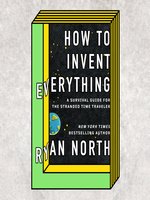מאת Ryan North
"How to Invent Everything is such a cool book. It's essential reading for anyone who needs to duplicate an industrial civilization quickly." —Randall Munroe, xkcd creator and New York Times-bestselling author of What If?
The only book you need if you're going back in time
What would you do if a time machine hurled you thousands of years into the past. . . and then broke? How would you survive? Could you improve on humanity's original timeline? And how hard would it be to domesticate a giant wombat?
With this book as your guide, you'll survive—and thrive—in any period in Earth's history. Bestselling author and time-travel enthusiast Ryan North shows you how to invent all the modern conveniences we take for granted—from first principles. This illustrated manual contains all the science, engineering, art, philosophy, facts, and figures required for even the most clueless time traveler to build a civilization from the ground up. Deeply researched, irreverent, and significantly more fun than being eaten by a saber-toothed tiger, How to Invent Everything will make you smarter, more competent, and completely prepared to become the most important and influential person ever. You're about to make history. . . better.
"How to Invent Everything is such a cool book. It's essential reading for anyone who needs to duplicate an industrial civilization quickly." —Randall Munroe, xkcd creator and New York Times-bestselling author of What If?
The only book you need if you're going back in time
What would you do if a time machine hurled you thousands of years into the past. . . and then broke? How would you survive? Could you improve on humanity's original timeline? And how hard would it be to domesticate a giant wombat?
With this book as your guide, you'll survive—and thrive—in any period in Earth's history. Bestselling author and time-travel enthusiast Ryan North shows you how to invent all the modern conveniences we take for granted—from first principles. This illustrated manual contains all the science, engineering, art, philosophy, facts, and figures required for even the most clueless time traveler to build a civilization from the ground up. Deeply researched, irreverent, and significantly more fun than being eaten by a saber-toothed tiger, How to Invent Everything will make you smarter, more competent, and completely prepared to become the most important and influential person ever. You're about to make history. . . better.





